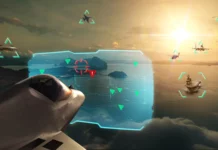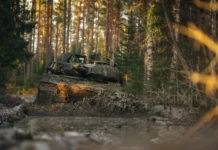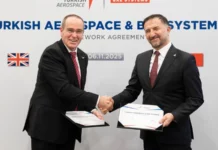The Amphibious Combat Vehicle (ACV) developed by BAE Systems and Iveco Defence Vehicles (IDV) has made its international debut by appearing at the FEINDEF defence and security exhibition, which was held in Madrid from 17 to 19 May 2023.
“This is the first time the Amphibious Combat Vehicle has been shown outside the United States, and it is a point of pride that it is here in Spain: an important, long-term US and NATO ally,” Garrett Lacaillade, vice president of amphibious programmes at BAE Systems, was quoted as saying in a 17 May BAE Systems press release.
The ACV programme was initiated by Marine Corps Systems Command in 2011 to replace the US Marine Corps’ ageing fleet of AAVP-7 Assault Amphibious Vehicles (AAVs) after the previous programme expected to do so, the Expeditionary Fighting Vehicle programme, was cancelled that year.

While full-rate production of the ACV for the USMC was initiated in December 2020, with the US Marines expected to procure just under 700 vehicles (including research, development, test and evaluation examples), the ACV promises to also find a significant export market among the 11 foreign users of the AAV. The Spanish Marine Infantry, for example, operates 19 AAVs.
“Jointly BAE Systems and IDV are proud to present this critical next-generation amphibious capability that meets the mission needs and program requirements of the Infantería de Marina Española,” Nazario Bianchini, head of sales at IDV, was quoted as saying in the BAE Systems release. “Together, we are ready to respond to any international customisation request to ensure the optimal deployment of the amphibious vehicles within the Spanish and European defence system.”
The ACV is produced in a number of variants, the basic iteration being the ACV-P personnel carrier, which is fully open-ocean capable and can carry 13 combat-loaded marines, along with a crew of three, from ship to shore and back. The ACV-C command-and-control variant provides multiple workstations for marines to maintain and manage situational awareness in the battlespace, while the ACV-R is a recovery variant that provides direct field support, maintenance, and recovery for the ACV family of vehicles. Meanwhile, the ACV-30 mounts a stabilised, remotely controlled turret manufactured by Kongsberg that houses a 30 mm RT-20 cannon for direct fire support.
Peter Felstead













